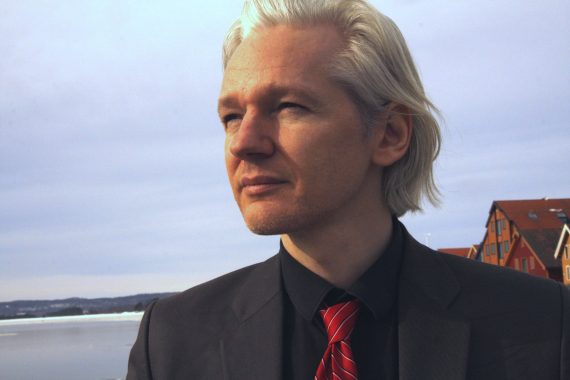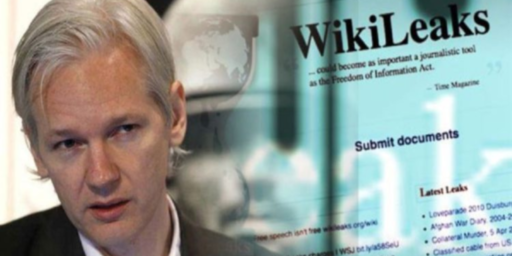Report: Julian Assange Will Not Be Prosecuted In Connection With Manning Case
The Justice Department is reportedly not planning to prosecute Wikileaks founder Julian Assange in connection with the Bradley Manning case.
The Washington Post reports that Wikileaks founder Julian Assange, currently still holed up in the Ecuadorean Embassy in London in an effort to escape extradition to Sweden over accusations of sexual assault, is unlikely to face any charges in the United States related to the secrets leaked to his organization by then Army Private Bradley Manning:
The Justice Department has all but concluded it will not bring charges against WikiLeaks founder Julian Assange for publishing classified documents because government lawyers said they could not do so without also prosecuting U.S. news organizations and journalists, according to U.S. officials.
The officials stressed that a formal decision has not been made, and a grand jury investigating WikiLeaks remains impaneled, but they said there is little possibility of bringing a case against Assange, unless he is implicated in criminal activity other than releasing online top-secret military and diplomatic documents.
The Obama administration has charged government employees and contractors who leak classified information — such as former National Security Agency contractor Edward Snowden and former Army intelligence analyst Bradley Manning — with violations of the Espionage Act. But officials said that although Assange published classified documents, he did not leak them, something they said significantly affects their legal analysis.
“The problem the department has always had in investigating Julian Assange is there is no way to prosecute him for publishing information without the same theory being applied to journalists,” said former Justice Department spokesman Matthew Miller. “And if you are not going to prosecute journalists for publishing classified information, which the department is not, then there is no way to prosecute Assange.”
Justice officials said they looked hard at Assange but realized that they have what they described as a “New York Times problem.” If the Justice Department indicted Assange, it would also have to prosecute the New York Times and other news organizations and writers who published classified material, including The Washington Post and Britain’s Guardian newspaper, according to the officials, who spoke on the condition of anonymity to discuss internal deliberations.
WikiLeaks spokesman Kristinn Hrafnsson said last week that the anti-secrecy organization is skeptical “short of an open, official, formal confirmation that the U.S. government is not going to prosecute WikiLeaks.” Justice Department officials said it is unclear whether there will be a formal announcement should the grand jury investigation be formally closed.
“We have repeatedly asked the Department of Justice to tell us what the status of the investigation was with respect to Mr. Assange,” said Barry J. Pollack, a Washington attorney for Assange. “They have declined to do so. They have not informed us in any way that they are closing the investigation or have made a decision not to bring charges against Mr. Assange. While we would certainly welcome that development, it should not have taken the Department of Justice several years to come to the conclusion that it should not be investigating journalists for publishing truthful information.”
There have been persistent rumors that the grand jury investigation of Assange and WikiLeaks had secretly led to charges. Officials told The Post last week that there was no sealed indictment, and other officials have since come forward to say, as one senior U.S. official put it, that the department has “all but concluded” that it will not bring a case against Assange.
Though the report doesn’t go into detail, it’s likely that one of the main problems that efforts to criminally prosecute Assange or anyone else associated with Wikileaks faced is the fact that prosecutors have apparently never been able to discover any evidence of collaboration between Manning and anyone at the organization prior to the time that Manning contacted them about the documents that he had already purloined. In that respect, as I’ve noted previously, there really wasn’t any substantive difference between the role of Wikileaks in the Manning case and the role of The New York Times and The Washington Post in The Pentagon Papers case. While the Federal Government showed no hesitation in suing both newspapers in civil court at the time in an effort to bar publication, an effort the government ultimately lost in a landmark Supreme Court ruling, even during the Nixon Administration there was apparently never any serious consideration of going after these on a criminal basis, nor should there have been.
Veteran First Amendment lawyer Floyd Abrams anticipated the reasoning behind the Justice Department’s apparent decision not to seek a criminal prosecution of Assange nearly three years ago in an Op-Ed in The Wall Street Journal:
The Justice Department is well aware that if it can prove that Mr. Assange induced someone in the government to provide him with genuinely secret information, it might be able to obtain an indictment under the Espionage Act based upon that sort of conspiratorial behavior. But the government might not succeed if it can indict based only upon a section of the Espionage Act relating to unauthorized communication or retention of documents.
Section 793 of the Espionage Act was adopted in 1917 before the Supreme Court had ever declared an act of Congress unconstitutional under the First Amendment. The statute has been well-described by former Supreme Court Justice John Marshall Harlan as “singularly oblique.” Its language is sweepingly overbroad, allowing prosecution of anyone who “willfully” retains or communicates information “relating to the national defense” he or she is not “authorized” to have with the knowledge that it “could” damage the United States or give “advantage” to a foreign nation.
On the face of the statute, it could not only permit the indictment of Mr. Assange but of journalists who actually report about or analyze diplomatic or defense topics. To this date, no journalist has ever been indicted under these provisions.
As Abrams notes, that is quite simply a precedent that should not be set.
Assuming that there is indeed no real evidence that either Assange or anyone else at Wikileaks was directly involve in Manning’s purloining of data from the classified files that he had access to, this strikes me as the correct decision. There is, perhaps, much about Wikileaks that can be criticized to the extent that they have a view about the availability of information that isn’t entirely realistic in a modern world where certain matters do need to remain secret for reasons of national security. At the same time, though, it’s also true that making information secret has, far too often, been a means for governments to cover up matters that are potentially embarrassing if not downright illegal. Additionally, it’s often a means for government to withhold from the public information that they arguably have a right to know. For example, it’s unlikely that we would be debating the issue of the proper limits of government surveillance if Edward Snowden had not leaked documents from the National Security Agency to Glenn Greenwald, a journalist who has seen himself come under some of the same criticism that Assange has in the months since The Guardian began publishing articles based on the information provided by Snowden. Given that prosecuting Assange would mean creating precedents that could potentially lead to prosecuting journalists doing their jobs as Greenwald did in the Snowden case. Yes, Assange may be a creepy-seeming guy and Wikileaks doesn’t really follow traditional rules of journalism in discerning what information should and shouldn’t be made public, but the potential costs of turning the massive resources of the Federal criminal justice system loose on a free press are far greater than the cost of not pursuing a case against one man that, in the end, may not be winnable.





Don’t prosecute him. Just let the CIA extradite him to one of our middle eastern allies and let them deal with him..
After a couple more years in Ecuadorian solitary he might ask for an indictment 😉
Greetings:
And, hell, he’s certainly no danger to our Republic like say, George Zimmerman.
First Prize: An indefinite stay at the Ecuadorean Embassy in London.
Second Prize: An indefinite stay in Ecuador.
Runners up get a holiday in Cambodia
He should be prosecuted for criminal Narcissism.
Hell, there wasn’t any substantive difference between what Wikileaks was doing with Manning and what the NYT and Washington Post were doing with Wikileaks.